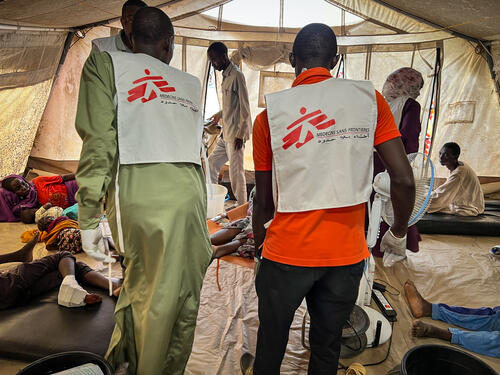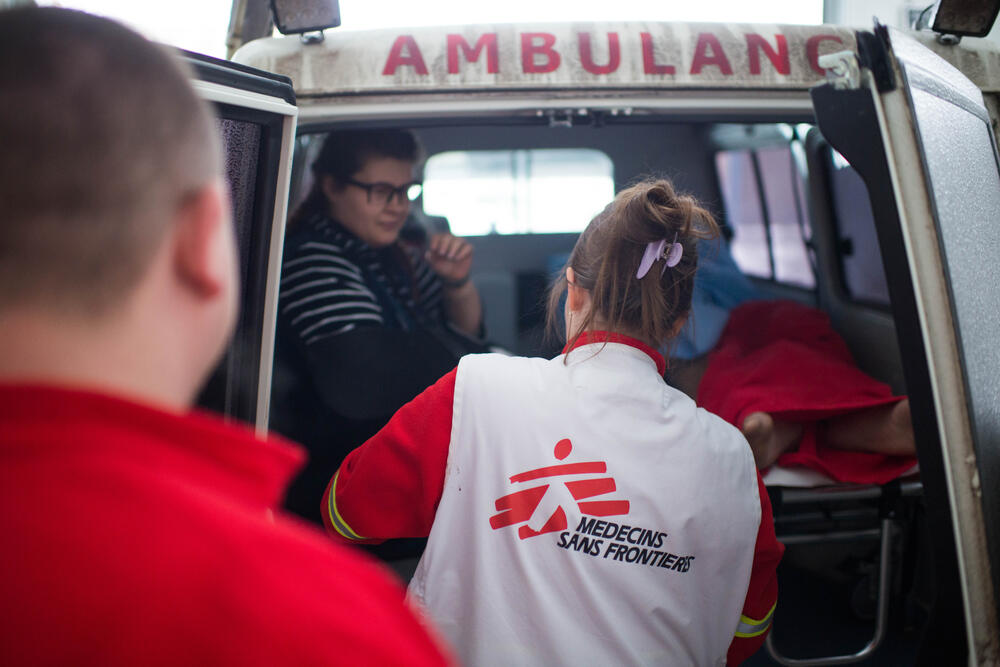Ukraine: As war enters fourth year the humanitarian crisis remains as urgent as ever
Three years after Russian forces invaded Ukraine, people continue to bear the devastating impact, as seen through their lost lives, lost limbs, and lost homes.
The 2022 invasion marked a dramatic escalation of an international armed conflict that began in 2014. Today, the resulting medical humanitarian needs are clearer than ever. Ukraine’s medical services are increasingly strained, with frequent attacks on hospitals, ambulances and medical structures.
Since 2022, Médecins Sans Frontières / Doctors Without Borders (MSF) has seen more patients with war-related trauma in need of rehabilitation, including post-amputation physiotherapy. The number of patients requiring treatment for post-traumatic stress disorder has also risen.
In areas close to the frontlines, daily shelling means that some of the most vulnerable, including older people and people with chronic conditions, have extremely limited access to medical care.
How is MSF helping people in Ukraine?
MSF runs an early rehabilitation project with centres in Cherkasy and Odesa, where people receive early post-operative physiotherapy, mental health support and nursing care following violent trauma. From 2023 to 2024, there was a 10 percent increase in the number of patients requiring post-operative care for leg amputations.
The need for mental health support in Ukraine is also significant. In 2024, half of all patients in the project were diagnosed with either post-traumatic stress disorder or depression.
In addition to centres in Cherkasy and Odesa, MSF has established a project focused on post-traumatic stress disorder in Vinnytsia.
In response to strikes, MSF operates ambulances, transferring patients from overburdened hospitals near the frontline to medical facilities with greater capacity in central and western Ukraine.
Over the past three years, MSF ambulances have transferred more than 25,000 people, more than half of whom had injuries caused by violent trauma.

Our work saves lives
“For some of the most vulnerable people, relocating isn’t an option”
Ukraine today
Today, Ukraine’s healthcare system faces immense pressure, balancing emergency responses with the ongoing needs of patients affected by the war. For three years, drone and missile attacks have been a daily occurrence, in some cases striking cities more than 620 miles from the frontline.
Medical facilities and systems have been forced to adapt to treat people in bunkers or basements, and deal with frequent power cuts from attacks on energy infrastructure.
In 2024, MSF mobile clinic and ambulance teams working near the frontlines saw a significant increase in referrals for patients with chronic diseases such as cardiovascular issues, diabetes, and cancer. In 2023, these cases accounted for 24 percent of all referrals, rising to 33 percent in 2024.
However, regular shelling and strikes mean that the access of MSF’s teams is not guaranteed. Many of those living with chronic conditions are older, and less mobile. In some areas, people have begun living in their basements or in bunkers, due to the intense shelling.
“For some of the most vulnerable people, relocating isn’t an option,” says Thomas Marchese, head of MSF in Ukraine.
“Not everyone is able to leave their homes and start their life again, but the continued fighting means that these people are frequently cut off from medical care, just as MSF medical teams are sometimes unable to travel to certain areas due to ongoing shelling.”
More support is needed
As the war in Ukraine enters its fourth year, MSF’s teams are witnessing the medical humanitarian crisis deepen every day.
The strength of the Ukrainian health system in the face of extreme violence is clear, but the need for sustained medical care and mental health support is greater than ever. The country’s infrastructure has sustained staggering damage, with hospitals coming under direct attack.
Even if the war were to end tomorrow, the long-term effects on people – physical and psychological – will linger for years to come. Hundreds of thousands of people will require ongoing care, rehabilitation, and therapy for trauma long after the last bomb falls.
MSF continues to work in Ukraine, close to the frontlines and further afield, but more support is required.
MSF in Ukraine
Médecins Sans Frontières / Doctors Without Borders (MSF) teams were already working in Ukraine before the escalation in February 2022.
From the first days of the crisis, we have worked to deliver emergency medical aid to people still in Ukraine, as well as those seeking safety in neighbouring countries.

